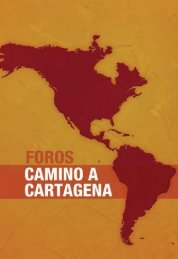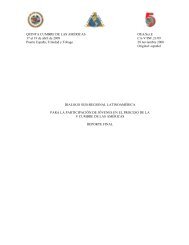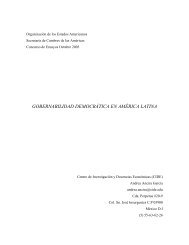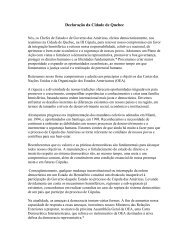The Road to Hemispheric Cooperation: Beyond the Cartagena
The Road to Hemispheric Cooperation: Beyond the Cartagena
The Road to Hemispheric Cooperation: Beyond the Cartagena
You also want an ePaper? Increase the reach of your titles
YUMPU automatically turns print PDFs into web optimized ePapers that Google loves.
COMMENTARy by vANDA fElbAb-bROWN<br />
Fellow at <strong>the</strong> Brookings Institution<br />
Kevin Casas-Zamora and Lucía Dammert are right <strong>to</strong> call for<br />
a comprehensive approach <strong>to</strong> fighting crime in Latin America.<br />
<strong>The</strong> need <strong>to</strong> incorporate well-designed socio-economic<br />
approaches in<strong>to</strong> anti-crime strategies applies not only <strong>to</strong> policies<br />
<strong>to</strong>ward social phenomena such as Latin American youth<br />
gangs, but also <strong>to</strong> fighting organized crime. This is because<br />
large populations in Latin America in areas with inadequate<br />
or problematic state presence, great poverty, and social and<br />
political marginalization continue <strong>to</strong> be dependent on illicit<br />
economies, including <strong>the</strong> drug trade, for economic survival<br />
and <strong>the</strong> satisfaction of o<strong>the</strong>r socio-economic needs. For<br />
many, participation in informal economies, if not outright illegal<br />
ones, is <strong>the</strong> only way <strong>to</strong> assure <strong>the</strong>ir human security and<br />
provide any chance of <strong>the</strong>ir social advancement.<br />
By sponsoring especially labor-intensive illicit economies,<br />
criminal (as well as militant) groups provide public goods<br />
<strong>to</strong> <strong>the</strong> marginalized population, suboptimal as <strong>the</strong>y may be,<br />
such as employment and an opportunity for social advancement.<br />
Criminal and belligerent groups also often provide security.<br />
While <strong>the</strong>se groups are <strong>the</strong>mselves sources of insecurity<br />
and crime, <strong>the</strong>y often regulate <strong>the</strong> level of violence and<br />
suppress certain forms of crime, such as robberies, <strong>the</strong>fts,<br />
kidnapping, and even homicides. <strong>The</strong>y may also provide dispute<br />
resolution mechanisms, including informal courts, in areas<br />
where formal justice processes are inaccessible <strong>to</strong> local<br />
populations. Functioning as order and rule providers brings<br />
criminal entities important support from <strong>the</strong> community.<br />
In short, organized crime groups can build far stronger ties<br />
<strong>to</strong> local populations than an absent state, <strong>the</strong> only manifestation<br />
of which frequently is repressive actions. Organized<br />
crime groups can thus obtain extensive political capital. To<br />
change crime dynamics, <strong>the</strong> state needs <strong>to</strong> outcompete criminal<br />
groups in providing public goods, including citizen safety,<br />
through more effective and accountable law enforcement.<br />
Although frequently portrayed as an effective solution <strong>to</strong><br />
<strong>the</strong> problem of organized crime, mere legalization of illicit<br />
economies, particularly of drugs, is no panacea.<br />
Proponents of legalization as a mechanism <strong>to</strong> reduce organized<br />
crime make at least two arguments: Legalization<br />
will severely deprive organized crime groups of resources.<br />
Legalization would also free Latin American law enforcement<br />
agencies <strong>to</strong> concentrate on murders, kidnappings,<br />
and ex<strong>to</strong>rtion.<br />
A country may have good reasons <strong>to</strong> want <strong>to</strong> legalize <strong>the</strong><br />
use and even production of some addictive substances<br />
(many, such as nicotine and alcohol, are legal) and ride<br />
out <strong>the</strong> consequences of greater use. Such reasons could<br />
include providing better health care <strong>to</strong> users, reducing <strong>the</strong><br />
number of users in prison, and perhaps even generating<br />
greater revenues and giving jobs <strong>to</strong> <strong>the</strong> poor. But without<br />
robust state presence and effective law enforcement, both<br />
elusive and <strong>the</strong> reason for <strong>the</strong> strength of organized crime<br />
in Latin America, <strong>the</strong>re is no guarantee that organized crime<br />
groups would be excluded from <strong>the</strong> legal drug trade. In fact,<br />
<strong>the</strong>y may have numerous advantages over <strong>the</strong> legal companies<br />
and manage <strong>to</strong> hold on<strong>to</strong> <strong>the</strong> trade, including through<br />
violent means. Nor does mere legalization mean that with<br />
a switch <strong>the</strong> state will be robustly and effectively present.<br />
Deep state deficiencies, not simply legalization or prohibition,<br />
explain why <strong>the</strong>re is so much illegal logging alongside<br />
legal logging, for example, or why smuggling in legal goods<br />
take place.<br />
Organized crime groups who may be displaced by legalization<br />
of <strong>the</strong> drug trade can hardly be expected <strong>to</strong> take <strong>the</strong><br />
change lying down. Ra<strong>the</strong>r, <strong>the</strong>y may intensify <strong>the</strong>ir violent<br />
power struggles over remaining illegal economies in Latin<br />
America, such as <strong>the</strong> smuggling of migrants and o<strong>the</strong>r illegal<br />
commodities, prostitution, ex<strong>to</strong>rtion, and kidnapping.<br />
To mitigate <strong>the</strong>ir financial losses, <strong>the</strong>y may also seek <strong>to</strong> take<br />
over <strong>the</strong> informal economy in Latin America—trying <strong>to</strong> control<br />
who sells <strong>to</strong>rtillas, jewelry and clo<strong>the</strong>s on <strong>the</strong> Zócalo. If<br />
<strong>the</strong>y succeed in franchising <strong>the</strong> informal economy and organizing<br />
public spaces and street life in <strong>the</strong> informal sec<strong>to</strong>r,<br />
<strong>the</strong>ir political power over society will be greater than ever.<br />
Nor does legalization imply that law enforcement would be<br />
liberated <strong>to</strong> focus on o<strong>the</strong>r issues or turn less corrupt: <strong>The</strong><br />
state would have <strong>to</strong> devote some (potentially substantial)<br />
resources <strong>to</strong> regulating <strong>the</strong> legal economy. In <strong>the</strong> absence<br />
of effective law enforcement, legal economies can still be<br />
pervaded by violence and corruption and be as abusive <strong>to</strong><br />
local communities as illegal ones (for instance, <strong>the</strong> logging<br />
sec<strong>to</strong>r in Latin America).<br />
<strong>The</strong> <strong>Road</strong> <strong>to</strong> <strong>Hemispheric</strong> <strong>Cooperation</strong>: <strong>Beyond</strong> <strong>the</strong> <strong>Cartagena</strong> Summit of <strong>the</strong> Americas<br />
<strong>The</strong> Brookings Institution ❘ Latin America Initiative<br />
75








